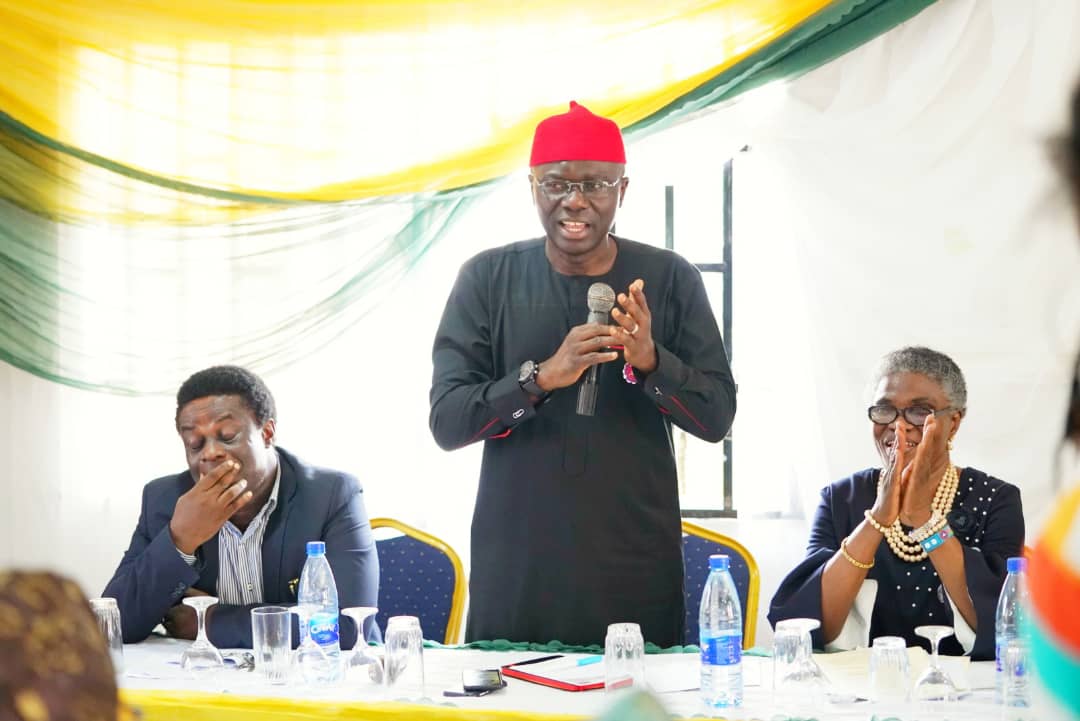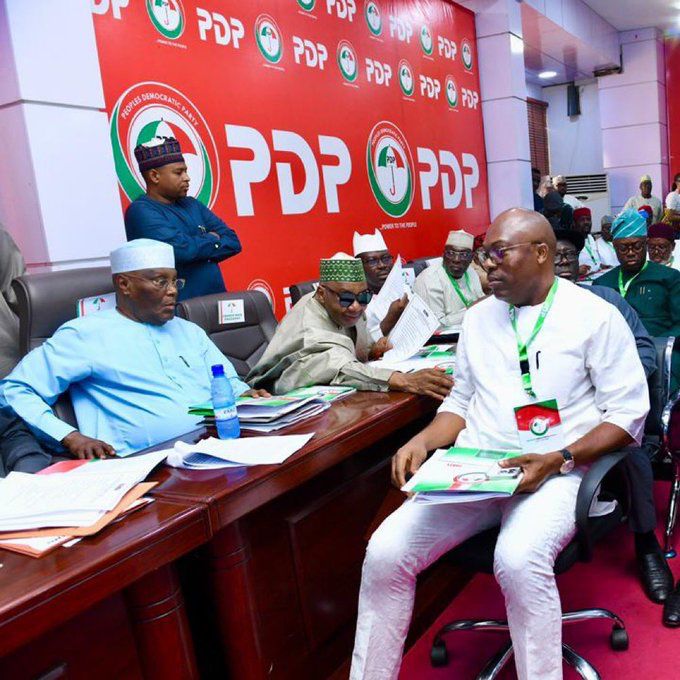The All Progressives Congress Lagos Gubernatorial flag bearer, Babajide Sanwo-Olu, has unveiled his 5 Pillars of Development agenda for a greater Lagos tagged “THEME”, while calling on his opponents to make the campaign issue-based as it affects the people.
The unveiling of THEME, which is an acronym for all aspects of governance, took place in a series of television interviews and special events which the governorship hopeful undertook at Television Continental, Channels Television, Lagos Television, Nigeria info FM, Wazobia FM and the Pharmaceutical Society of Nigeria in a very busy week of agenda setting and stakeholders engagement.
The 3-time Lagos Commissioner, who is a graduate of University of Lagos and an alumnus of Harvard Kennedy School of Government, was the brain behind many reforms that birthed key transformational initiatives in Lagos such as the private sector-led Lagos State Security Trust Fund, Lagos State Pension Commission, Lagos Bus Management (LAGBUS) among others.
As an Advisor to the Bureau of Public Enterprise (BPE) on privatization, concession and commercialization of a number of public assets under the Federal Government privatization programme, Sanwo-Olu had the privilege of working on some landmark deals that resulted in the optimization of public assets including the Aluminum Smelter Company (ALSCON), National Arts Theatre, Lagos International Trade Fair Complex, Ikoyi Hotels Limited. Sanwo-Olu also worked on the Federal Government Debt Conversion Programme.
‘THEME’’, the policy initiatives, is detailed as follows:

T- Traffic Management & Transportation.
“Our plan is to integrate road, rail and water transportation in Lagos to solve the problem of commuting within the metropolis. We will fix all bad roads and expand our road infrastructure. We will complete existing road projects and fix inner city roads. We will improve navigation on our waterways to facilitate water transportation and promote private investment. Part of our plan is to complete the ongoing Blue Line rail project from Okokomaiko-Marina and kick-start the Red line from Agbado to Marina.
On traffic management, we have identified over 60 gridlock points as the major causes of traffic around Lagos. We are going to work with the federal government to complete the Lagos-Apapa road, build a 5000-capacity trailer park and also work with the Nigerian Port Authority for a strict on-call system that notifies trailers when to pick-up containers to avoid the indefinite waiting period. This is a very important part of our plan. We have a comprehensive strategy for achieving set goals”. We are particularly committed to reducing travel time within Lagos.
H- Health & Environment
“Our healthcare plan will be anchored on comprehensive health insurance scheme for Lagosians to improve access and affordability. We will improve primary and complete many secondary health facilities. We will work with private investors as well to ensure that Lagos is the health care destination for Nigerians. I am meeting with different health care stakeholders, and was a guest at the Pharmaceutical Society of Nigeria end of the year event, where we discussed ways to improve health care delivery in Lagos.
To keep our environment clean and healthy, we will rejig the waste management system by getting LAWMA to deliver better on its mandate as the regulator, while the PSP model will be made to respond better in collection of waste in Lagos. On the advocacy, we have plan to turn waste to wealth. This we will do by incentivizing waste sorting by our people. We must begin to separate organic waste from other household waste and put them in separate waste bags for recycling companies that will turning waste to primary and secondary raw materials. Those who properly sort their waste can make money.
E- Education & Technology.
“Our plan is to increase access to public education in Lagos, especially public primary and secondary schools. We will immediately embark on renovation of our schools and make them conducive for learning. Teachers will be trained for capacity enhancement in modern teaching methodology. We want to make teaching a more lucrative field of interest and attract the best of teachers to Lagos schools. We want to work with our educational institutions to improve curriculum and include entrepreneurial studies in our educational programmes.
We also want to create a smart economy on the back of technology. We will create incubation hubs in Lagos for technology startups to flourish, while also ensuring that we introduce coding into our public school curriculum.
I understand the transformative power of Technology. Technology will improve the rule of law, education, ease of doing business and government processes. Technology will reduce approval process circle in public-private sector dealings. It will improve government efficiency. Giving Entrepreneurs and SMEs the opportunity to thrive will lead to more jobs and more public-private sector partnerships”.
M- Making Lagos a 21st century economy
“We will support the private sector by creating an enabling environment for businesses to thrive. We will simplify access to government services to make the private sector blossom. We are going to work with the Power Distribution and Power Generating companies to solve the problem of power in Lagos. By this, we will have enough power in Lagos to drive the economy and improve the lives of the citizens. We provide more infrastructure and improve the existing ones to support private businesses and increase productivity of Lagosians. Lagos should be a 24-hour economy. Security will be very key item on our policy agenda. We will strengthen security agencies in Lagos and equip them to do better.
E- Entertainment & Tourism
“Lagos is the centre of culture and entertainment capital of Africa. We will boost our creative economy with tourism, culture and entertainment. We will develop all our tourism assets in Lagos and create tourism calendar around our important events, like the Eyo festival – such that it will attract local and international tourists. We will work with the music, film and fashion industries to make Lagos an international tourist destination.
Again, security and infrastructure are key to tourism and entertainment economy because people must feel safe to go out anytime of the day and visit tourist centres.
According to Sanwo-Olu, specific details of the THEME initiatives will be unveiled to the public
Supporting the 5 main pillars, he has also listed the following as areas of focus;
-
Infrastructure
-
Housing
-
Ease of doing business
-
Land reform
-
Power

 News6 years ago
News6 years ago
 Featured6 years ago
Featured6 years ago
 Boss Picks6 years ago
Boss Picks6 years ago
 Headline6 years ago
Headline6 years ago
 Headline6 years ago
Headline6 years ago
 Headline5 years ago
Headline5 years ago
 Headline6 years ago
Headline6 years ago
 Headline6 years ago
Headline6 years ago














